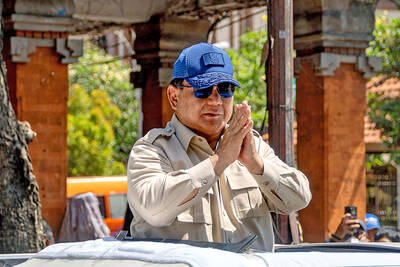On the groom's last night as a single man, a bachelor party on his front lawn kicked off with song and dance.
"We love you to death, Moqtada," a pair of singers crooned in praise of Moqtada al-Sadr, the fiery anti-American cleric who, though absent, overshadowed the groom. "We love you as much as there are leaves on a tree."
Out came one of the groom's best friends, waving his arms like a carnival barker.
"Those who follow the Americans are dogs," he yelled. "We swear by Moqtada that we won't let our machine guns stop!"
Loyalty to the Shiite cleric burns fierce here in northeastern Baghdad, and especially in Sadr City, a vast slum of 2.2 million people, despite frequent US raids and almost nightly airstrikes. The US military has stepped up its campaign to rout the Mahdi Army, al-Sadr's militia, on its home turf here, to drive him to the bargaining table. But it is often impossible to distinguish between civilians and fighters.
A reporter, photographer and interpreter with The New York Times recently spent nearly 24 hours being guided through the battleground streets -- and even to a guerrilla bachelor party -- by one of al-Sadr's midlevel aides. It became apparent that the Mahdi Army here is less a discrete military organization than a populist movement that includes everyone from doctors to policemen to tribal sheiks, and whose ranks swell with impoverished men willing to die.
The day began with a drive to the home of the al-Sadr aide, a slim, balding 35-year-old man who gave his name simply as Muhammad. Donkey carts plied the dusty streets, mounds of trash lined wide avenues and posters of chubby, black-turbaned al-Sadr were plastered across every block. Graffiti in English decorated some walls: "Vietnam Street -- We'll make your graves in this place."
Muhammad's home was tucked into a narrow alley in the Chewadar neighborhood. A reeking open channel of sewage ran along the street. A boy dashed around with a toy rifle propped on his shoulder like a rocket-propelled grenade launcher. Nearby, other children played soccer in dirt lots, and women in black robes peeked out from their doorways.
The home was typical of many in Sadr City: a two-story ocher building, with an extended family of 35 squeezed into 1,500 square feet. Muhammad's family moved here in 1962 from Amara, a southern city, before his birth. He is the second oldest of six brothers, many of whom are members of the Mahdi Army.
"If the Americans didn't try entering Sadr City with their tanks, I can guarantee you not a single bullet would be fired," Muhammad said over a lunch of lamb kebab; a framed portrait of al-Sadr was on the wall behind him. "Everyone here is part of the resistance."

DEADLOCK: Putin has vowed to continue fighting unless Ukraine cedes more land, while talks have been paused with no immediate results expected, the Kremlin said Russia on Friday said that peace talks with Kyiv were on “pause” as Ukrainian President Volodymyr Zelenskiy warned that Russian President Vladimir Putin still wanted to capture the whole of Ukraine. Meanwhile, US President Donald Trump said that he was running out of patience with Putin, and the NATO alliance said it would bolster its eastern front after Russian drones were shot down in Polish airspace this week. The latest blow to faltering diplomacy came as Russia’s army staged major military drills with its key ally Belarus. Despite Trump forcing the warring sides to hold direct talks and hosting Putin in Alaska, there

North Korea has executed people for watching or distributing foreign television shows, including popular South Korean dramas, as part of an intensifying crackdown on personal freedoms, a UN human rights report said on Friday. Surveillance has grown more pervasive since 2014 with the help of new technologies, while punishments have become harsher — including the introduction of the death penalty for offences such as sharing foreign TV dramas, the report said. The curbs make North Korea the most restrictive country in the world, said the 14-page UN report, which was based on interviews with more than 300 witnesses and victims who had

COMFORT WOMEN CLASH: Japan has strongly rejected South Korean court rulings ordering the government to provide reparations to Korean victims of sexual slavery The Japanese government yesterday defended its stance on wartime sexual slavery and described South Korean court rulings ordering Japanese compensation as violations of international law, after UN investigators criticized Tokyo for failing to ensure truth-finding and reparations for the victims. In its own response to UN human rights rapporteurs, South Korea called on Japan to “squarely face up to our painful history” and cited how Tokyo’s refusal to comply with court orders have denied the victims payment. The statements underscored how the two Asian US allies still hold key differences on the issue, even as they pause their on-and-off disputes over historical

CONSOLIDATION: The Indonesian president has used the moment to replace figures from former president Jokowi’s tenure with loyal allies In removing Indonesia’s finance minister and U-turning on protester demands, the leader of Southeast Asia’s biggest economy is scrambling to restore public trust while seizing a chance to install loyalists after deadly riots last month, experts say. Demonstrations that were sparked by low wages, unemployment and anger over lawmakers’ lavish perks grew after footage spread of a paramilitary police vehicle running over a delivery motorcycle driver. The ensuing riots, which rights groups say left at least 10 dead and hundreds detained, were the biggest of Indonesian President Prabowo Subianto’s term, and the ex-general is now calling on the public to restore their